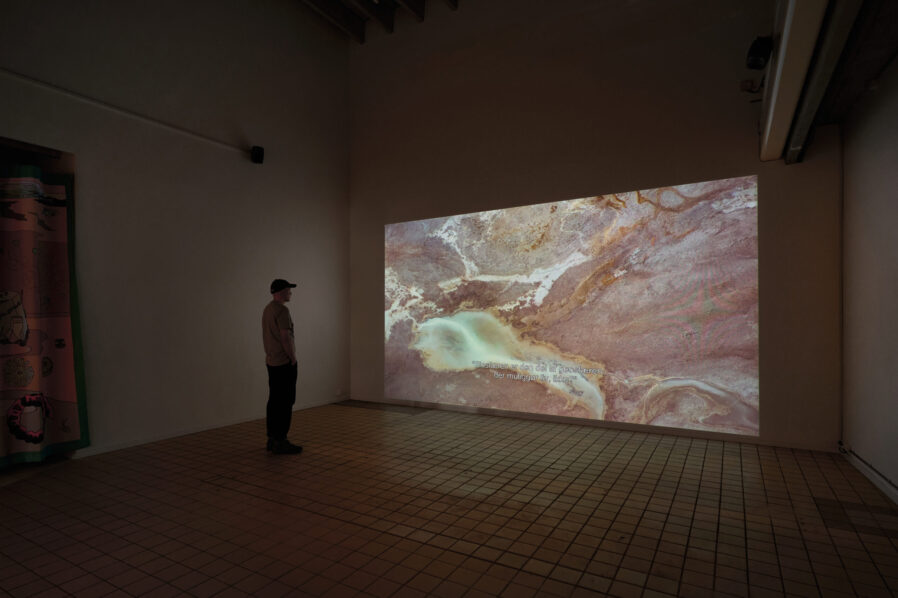 Rikke Luther: Dust & Flow – Mud in the Earth System, Room Room, 2025. Photo: Brian Kure
Rikke Luther: Dust & Flow – Mud in the Earth System, Room Room, 2025. Photo: Brian Kure
Room Room :
Talk with Katherine Richardson & Rikke Luther: A muddy diary
Join us for an evening about the latest climate research and how as a researcher you manage the important task of communicating it, when climate researcher Katherine Richardson together with visual artist Rikke Luther give a talk in connection with Luther's exhibition Dust & Flow – Mud in the Earth System at Room Room. It's on 4 June at 6:30 PM at Thoravej 29.
~
Glaciers, sea ice and permafrost are melting. Land is subsiding and slipping away. Lakes recede, lakebeds collapse and swelling mud flows towards the oceans at an ever-increasing pace.
For millennia, the Earth system has behaved in a way that was largely stable. Until now. Human-induced global heating has set everything into motion, and the most dramatic changes to the landscape are currently unfolding in the Arctic and Antarctic, where the pace is so rapid that scientists are struggling to keep up with the mapping of new biochemical topographies.
For several years, artist Rikke Luther has worked with climate change in her practice-based research—most recently with a specific focus on mud and sediments, and how we, as humans, attempt to comprehend the accelerating transformations that our Earth system is undergoing.
Rikke Luther’s practice-based postdoctoral research is artistic hosted by and scientifically anchored at ROCS, an institute at the Universities of Copenhagen and Iceland, led by Professor Katherine Richardson, former member of the Danish Council on Climate Change (2019–2025) and head of the Planetary Boundaries research project.
Richardson has conducted groundbreaking research in marine biology for decades, and she is central to the development of ‘Earth System Science’, a relatively new field of scientific research that brings together different scientific disciplines to understand our planet as one coherent but complex system, and how these are affected by human activities.
In her work, Katherine Richardson is deeply concerned with communicating her subject area, and this happens in a wide range of different ‘outputs’: publications, podcasts and exhibitions. By giving Rikke Luther a place at ROCS, Richardson has made her and her colleagues’ research results, conversations, and processes available to art, and it is many of these insights that have provided inspiration for Luther’s exhibition Dust & Flow – Mud in the Earth System at Room Room. Later this year, Luther will also publish a book about her research, to which Richardson also has contributed.
On Wednesday, June 4, the two will meet in a talk and speak about their respective work: Richardson about 'Earth System Science' and the central role of mud in understanding life and climate on Earth. Luther about her exhibition and offering an artistic language to the Earth's drastic changes.
~
INFO
Wednesday, 4 June 2025
6:30 – 08:00PM
Art Hub Copenhagen // Room Room
Thoravej 29
2400 Copenhagen NV
A ticket costs 30 DKK and includes a glass of wine. Tickets can be purchased here via Billetto.
Please notice, the event will be held in Danish.
Read more and see pictures from the exhibition Dust & Flow – Mud in the Earth System here.
~
ABOUT KATHERINE RICHARDSON
Dr. Katherine Richardson’s research is to better understand the role of biological processes and biodiversity on the cycling of carbon in the upper ocean and how this impacts food webs and the global carbon cycle.
Essentially, Richardson’s research both within biological oceanography and in relation to the Planetary Boundaries focuses on understanding the interactions between the Geosphere and the Biosphere, as it is these interactions than have been the internal drivers of Earth system state throughout the history of the Earth.
Dr. Richardson pioneering contributions have been instrumental in shaping global sustainability efforts. She is the core developer of the Planetary Boundaries Framework that attempts to identify how much of specific Earth System Services that can “safely” be appropriated by humans and the led writer on the paper Planetary Boundaries –The study was published in Science Advances and has now been downloaded for nearly 600.000 times.
Richardson is leading the Queen Margrethe's and Vigdís Finnbogadóttir's Interdisciplinary Research Centre on Ocean, Climate, and Society (ROCS).
ABOUT RIKKE LUTHER
Artist and PhD Rikke Luther (b. 1970) graduated from the Royal Danish Academy of Fine Arts in 1998. In her current practice, she investigates the movements in the ‘Earth System’ brought about by human-driven climate, environmental and biodiversity crises. Her work engages with themes relating to emerging landscapes, language, politics, economics, law, biology and geology, expressed through drawn mappings, photography and film.
Luther’s work has been presented at biennales and triennales including Venice, Singapore, Echigo-Tsumari, Auckland, Gothenburg and São Paulo; in museums and institutions such as HKW, the Smart Museum, Kunsthaus Bregenz, The New Museum and Museo Tamayo; in exhibitions including Beyond Green: Towards a Sustainable Art, 48C Public.Art.Ecology and Weather Report: Art & Climate Change; as well as at film festivals including CPH:DOX and the Perth International Film Festival.
ABOUT RIKKE LUTHER'S POST DOCTORAL PROJECT
Ocean-Lands: Mud in the Earth System explores both the social and bio-communicative effects of shifting sea and land mudscapes, as part of a broader attempt to build a new ethical and aesthetic public language capable of communicating the crisis facing our Earth system.
Luther’s postdoctoral research is academically anchored at Queen Margrethe's and Vigdís Finnbogadóttir's Interdisciplinary Research Centre on Ocean, Climate, and Society (ROCS), based at the Center for Macroecology, Evolution and Climate, Globe Institute. The project is funded by the Novo Nordisk Foundation and ROCS.







